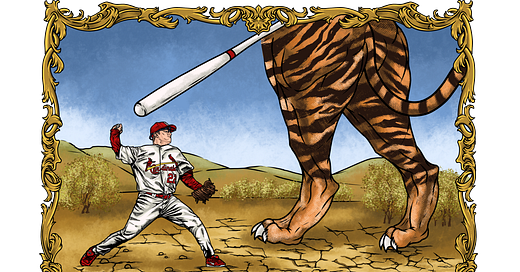By Eugene Tucker
“Prediction: The Detroit Tigers biggest obstacle to a championship will be keeping a straight face. The Tigers in three.” – Bob Nightengale, USA Today, prior to the 2006 World Series.
Glib as it was, Nightengale’s prognostication was rooted in certain uncontroverted facts:
The Cardinals had the fewest regular season wins of any World Series participant since the 1973 Mets;
No team had ever won a World Series that also had two 8 game losing streaks during the season;
The Cardinals finished the regular season losing 10 of their last 15 games, which included a seven game losing streak;
The Tigers, on the other hand, had won 95 games;
In the ALDS, the Tigers defeated a Yankees team that sported an All-Star at every spot in the lineup;
They followed that feat with a sweep of Oakland in the ALCS.
When looking at it from that lens, maybe giving the Cardinals three games was generous.
It was obvious. If these Cardinals were to defeat the Tigers they needed a David.
***
“When people see me,” David Eckstein once said, “I don’t really look like your typical pro athlete.”
David Eckstein was a good, not great, baseball player. He didn’t hit for power, nor did he walk all that often. He wasn’t especially fast and was often injured, only playing over 140 games four times during his ten seasons. For most of his career, he was probably a second baseman miscast as a shortstop, with even Cardinals’ beat reporter Derrick Goold pointing out upon Eckstein’s signing that “his arm isn’t that strong from the hole.”
The above sounds harsh - but former teammates, coaches, and opponents alike would usually breeze past Eckstein’s baseball abilities to highlight instead his intangibles and stature.
Preston Wilson, former teammate: “He’s as cute as can be, but he’s gritty. When he’s on your team, you love him. But on the other side, he’s like the pest that you cannot get out of your house.”
Willie Randolph, former Mets manager: “He’s just one of those hard-nosed players. His talent doesn’t jump out at you. But he’s a winner. He fights you. He battles. He puts the ball in play. He gets the most out of his abilities and his skills.”
Joe Maddon, former Angels bench coach: “And I’ve never seen the guy have a bad day. Even if he goes 0-for-4 and makes three errors, he helps you.”
Gritty. Hard-Nosed. Small. Look! He thinks he’s a major league baseball player. It’s so cute.
***
David vs Goliath is a story that has been told for millennia: the unlikely underdog with odds stacked high overcomes adversity and in victory proves all things are possible to those who believe. It’s boring. It’s rote. It’s cliché.
It is such a cliché in fact that people began to have visceral reactions to the Eckstein story. They felt that he was unfairly presented as this Platonic ideal of a baseball player who through sheer will and determination never got out. When in reality, all evidence definitively and indisputably proved Eckstein was actually very easy to get out. They looked on with disgust. Baseball is not a morality play. Just because David Eckstein is short and tries hard does not mean he should be praised and emulated. He was 0-11 to start the World Series, for goodness sake! Why is this being praised?
Because sometimes life is a cliché.
Sometimes David Eckstein - all five foot seven inches of him - digs into the batter’s box in bottom of the eighth inning of a tied World Series game. Sometimes standing 60 feet and six inches away is Joel Zumaya, a man who up to that point had thrown the fastest pitch in baseball history. Sometimes Craig Monroe has so little faith that Eckstein could possibly hit Zumaya that he sneaks in so far he is basically playing a deep short. Sometimes it seems more likely that Eckstein’s parents will receive a call informing them their son is breaking curfew, then he will actually come through in such a situation.
And then some times, somehow, David Eckstein does connect and he lifts Zumaya’s 99 mph fastball into right field. Sometimes Monroe realizes his hubris too late and scrambles in an attempt to make the catch. Sometimes Monroe’s dive comes up centimeters short and the ball caroms off the webbing of his glove. And sometimes Aaron Miles scores from second, replaced there by David Eckstein, who has just hit his third double of the game. Sometimes the Cardinals hold on in the ninth to take a commanding three games to one lead in the World Series.
***
Eckstein would add two more hits and two more RBIs in the clinching game 5 the next night on his way to being named MVP of the 2006 World Series. David triumphed over Goliath - again.
When Eckstein signed as a free agent with the Cardinals at the end of the 2004 season, Cardinals GM Walt Jocketty described Eckstein as the “kind of player St. Louis will embrace and I think he will become a cult hero with our fans.”
Sure enough, he did. For two nights at least, David Eckstein put together enough hits in the right situations to have his story mythologized. Yes, it’s a story that’s been told so often that it’s become a cliche. But you know what, it’s a fun story and there’s a reason it’s remembered. And if you don’t see that, well, maybe the flaw isn’t in the story.




